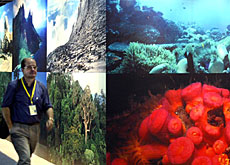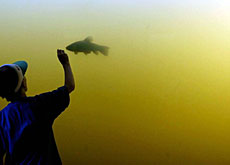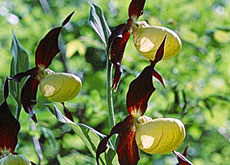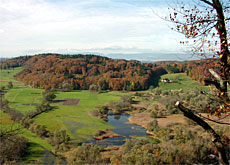Time runs out to save species

Hopes are high that an international conference in Malaysia will agree on ways to reverse the decline in plant and animal species worldwide.
But the head of the Swiss delegation has warned that time is running out.
“If we can make a start, we can at least show the world that we’re serious about what we’re doing,” Beat Nobs, Swiss ambassador for the environment, told swissinfo.
He was speaking ahead of the seventh meeting of the Conference of the Parties to the Convention on Biological Diversity, which opened in Kuala Lumpur on Monday.
According to the World Conservation Union (IUCN), 27,000 species disappear worldwide every year and 24 per cent of mammal and 12 per cent of bird species are now critically endangered.
The rapid decline in biodiversity worldwide is largely due to human activities in the form of urbanisation and intensive agriculture.
Plan of action
At the Earth Summit in Rio in 1992, world leaders set targets to save the planet from species extinction with the Convention on Biological Diversity – a non-binding treaty which sets out goals, policies and general obligations.
Ten years later at the Johannesburg Earth summit, they agreed to try to reverse the decline by 2010 – but failed to set out concrete measures.
With just six years left to go, there is a growing urgency to reduce biodiversity loss at the global, regional and national level.
“Time is running out very fast,” said Nobs. “If we can put the bandwagon on the rails and if we can move in a direction which slows down the loss, we’ll have gained a lot.”
Protected areas
Environmentalist says the world’s prosperity is dependent on conserving biodiversity.
They say biodiversity provides a wide range of goods and services for society and lies at the heart of food supplies, medicine and clean water.
“The convention represents a unique forum for sustainable strategies designed to preserve our ecosystems, alleviate poverty and improve the quality of life on Earth,” said Martha Chouchena-Rojas, head of the IUCN delegation.
The need to establish protected areas has long been recognised and these now cover 11.5 per cent of the Earth’s land surface.
However there is less agreement on how to compensate the populations, which protect or manage forests and other natural habitats for the benefit of humanity at large.
“We are not just talking about national parks, which are protected in their entirety,” explained Nobs.
“Protected areas must also provide sustainable use for their inhabitants or the people around them. Only if people are involved do we have a chance to really implement the [measures we need].”
Biosafety
The issue of biosafety will also be on the agenda in Kuala Lumpur, with delegates focusing on how to protect biological diversity from the potential risks posed by genetically modified organisms.
“Every country should have the right to be clearly informed about which genetically modified organisms it allows to be imported,” said Nobs.
Access to genetic resources and benefit sharing, as well as the unique biodiversity of mountain regions will also be discussed.
Nobs added biodiversity protection needed to be integrated into every field of human activity, including agriculture, tourism and forest management.
Population pressure
Switzerland is not exempt from biodiversity losses. Some 32 per cent of wild plant species, 95 per cent of amphibian species and 80 per cent of reptile species are threatened or have been wiped out.
In Switzerland’s forests, 24 per cent of bird species are threatened by extinction.
Nobs said Switzerland had elements of a biodiversity strategy in place but that a lot of work remained to be done.
“A country like Switzerland with a large population and rather small inhabitable area suffers from great pressure on its biodiversity.”
He cited a recent study of Switzerland’s 70 fish species, which shows that eight are considered extinct, five nearly extinct and 45 others threatened.
swissinfo, Vincent Landon
The seventh meeting of the Conference of the Parties to the Convention on Biological Diversity is taking place in Kuala Lumpur, Malaysia, from February 9-20.
It will be followed by the first meeting of the Parties to the Cartagena Protocol on Biosafety from February 23-27.
Scientists estimate that between 10 and 100 million plant and animal species now exist on the planet.
Countries are trying to agree on ways to reduce the current rate of biodiversity loss.

In compliance with the JTI standards
More: SWI swissinfo.ch certified by the Journalism Trust Initiative











You can find an overview of ongoing debates with our journalists here . Please join us!
If you want to start a conversation about a topic raised in this article or want to report factual errors, email us at english@swissinfo.ch.